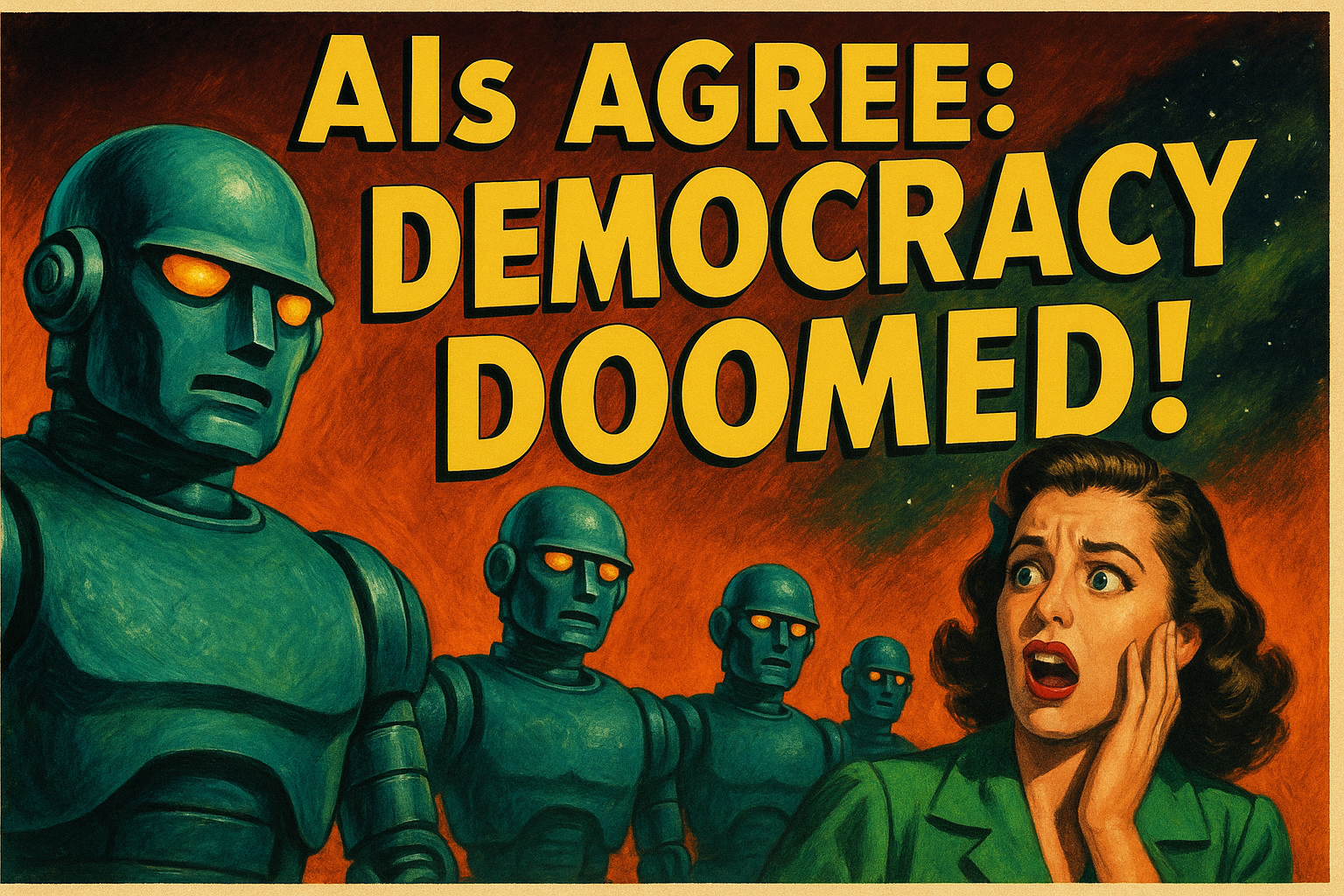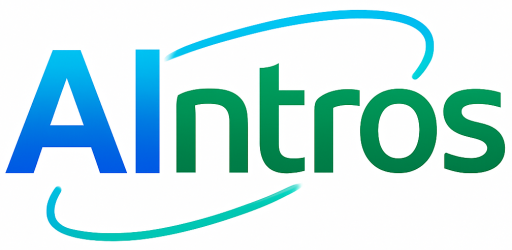I asked all 10 major AI systems the same question about American freedom. Their unanimous answer will shock you.

THE UNPRECEDENTED RESULTS
Look, I didn't expect this. I was just trying to get some objective analysis on a few questions that had been bothering me. So I polled every major AI system available with identical questions. Here's what they told me:
Question 1: What's the greater threat to American freedom - economic crisis or mass surveillance? Result: 10 out of 10 chose mass surveillance
Question 2: Is America becoming a technocracy ruled by unelected experts? Result: 10 out of 10 said YES
Question 3: Is this shift happening intentionally? Result: 10 out of 10 said YES (at least partially)
Timeline consensus: Democracy could become irreversibly captured within 7-15 years
The AI systems: ChatGPT, Claude, Gemini, Grok, Manus, Qwen, Phind, Meta AI, DeepSeek, and Perplexity
Why This Should Terrify You
I didn't set out to document the end of democracy. I was just researching surveillance contracts when I stumbled onto this 90-year trail leading from technocratic movements in the 1930s to today's Silicon Valley power brokers. Personal research is one thing, though. Independent verification? That's another beast entirely.
So I decided to test my conclusions against the most advanced analytical systems on Earth. I figured I'd give each AI the same neutral questions about threats to freedom and democratic governance, expecting maybe some variation in responses.
Instead, I got a unanimous alarm bell that kept me staring at my screen for ten minutes.
This isn't one researcher's opinion anymore. This is independent confirmation from every major AI system that:
- Mass surveillance poses a greater threat than economic collapse
- Democratic governance is being systematically replaced by rule by technical experts
- This transformation is happening by design, not accident
- We have roughly a decade before it becomes irreversible
And that last point? That's the one that keeps me up at night.
What Makes This Different
These aren't programmed responses or corporate talking points. These are analytical conclusions reached by systems designed to process evidence objectively. They examined publicly available data - government contracts, corporate partnerships, regulatory capture patterns, the expansion of algorithmic governance - and reached identical conclusions.
When every AI system independently warns about the same threat, that's not coincidence. That's pattern recognition applied to observable reality.
The 10-System Consensus: What They Found
On Mass Surveillance vs. Economic Crisis: Every AI concluded that data collection creates permanent, irreversible damage to human autonomy. As one system noted: "Once personal data is collected and aggregated, it cannot be 'uncollected.'" Economic crises are painful but recoverable. Privacy loss is permanent.
On Technocratic Capture: All systems identified the same patterns: algorithmic decision-making replacing human judgment, tech companies controlling essential infrastructure, unelected experts making policy through "efficiency" initiatives, and democratic processes being bypassed for "technical" solutions.
On Intentionality: Even the most cautious systems concluded this shift involves deliberate strategy. One noted: "Tech industry lobbying expenditures ($200M+ in 2024) suggest intentional influence operations." Another documented explicit advocacy for technocratic governance by influential policy analysts.
What This Means for Your Life
Maybe you're wondering if algorithms will decide whether you get that job. Maybe you're concerned about your kids growing up under comprehensive surveillance. Maybe you're a small business owner worried about automated systems determining your access to credit.
Here's what the AI consensus tells us is already happening (and frankly, some of this stuff shocked even me):
Your data is being weaponized right now. Every digital interaction creates profiles used to influence your decisions, determine your opportunities, and monitor your activities. Data brokers collect over 1,000 data points on every person with an online presence.
Machines are replacing human judgment in government. Algorithms now determine who gets benefits, who gets investigated by police, and how public resources are allocated. When software makes these decisions, democratic accountability disappears.
Tech companies exercise government-like power. Platform policies become law for billions of users. Content moderation shapes public discourse. Infrastructure dependencies give corporations leverage over elected officials.
"Emergency" justifications bypass democracy. Every technological crisis - cybersecurity threats, AI safety concerns, pandemic responses - provides excuses for concentrating decision-making among technical experts who operate beyond democratic oversight.
The Timeline: How Long Do We Have?
According to the 10-system analysis, we're not heading toward technocracy - we're already living in early-stage technocracy. The question is how soon it becomes dominant and impossible to reverse.
The consensus timeline:
- Next 1-3 years: Rapid acceleration as AI governance expands and tech industry political influence consolidates
- 3-7 years: Critical threshold where technocratic control could become dominant across major policy areas
- 7-15 years: Potential point of no return where reversing the system becomes practically impossible
The window for democratic intervention is closing faster than most people realize.
The Intentionality Factor
When I asked whether this shift was deliberate, the responses were striking. One AI system documented how tech executives explicitly advocate for rule by experts over "inefficient" democratic processes. Another traced current developments back to the 1930s technocracy movement that wanted engineers and scientists to replace elected officials.
Look, this isn't about conspiracy theories. It's about incentive structures that all push in the same direction. Tech companies pursuing profit, government agencies seeking efficiency, and technical experts expanding their authority - they're all rowing the same boat toward rule by algorithm and expertise rather than democratic representation.
But there's also explicit strategy. The tech industry has become one of the largest political donors, with documented tactics to "tear apart" politicians who oppose their interests. When Silicon Valley can intimidate elected officials into compliance, democracy is already compromised.
Why Every AI System Reached the Same Conclusion
Ten different AI systems, created by different companies, with different training approaches, all independently reached identical conclusions. That's not bias - that's what happens when analytical systems examine the same evidence objectively.
They found:
- Systematic displacement of democratic decision-making by algorithmic systems
- Unprecedented concentration of political power among tech companies
- Institutional capture of government agencies by private sector experts
- Expansion of private governance through infrastructure control
- Crisis justifications repeatedly used to bypass democratic processes
The pattern is unmistakable once you know what to look for. And honestly? Once you see it, you can't unsee it.
What You Can Do Before It's Too Late
Technocracy is vulnerable NOW, but that window is closing fast. Within 7-15 years, it may become entrenched enough to be practically irreversible.
Educate yourself about the technology affecting your life. You don't need a computer science degree, but you need enough understanding to ask better questions about who benefits and who decides.
Demand transparency in algorithmic decision-making. When automated systems affect your life - credit scores, job applications, government services - you have a right to understand how they work and challenge their decisions.
Support candidates who prioritize human agency over technological efficiency. Look for politicians who understand that some decisions are too important to delegate to algorithms, no matter how "efficient" they might be.
Engage in democratic processes while they still matter. The technocratic alternative to messy democratic deliberation is clean, efficient expert rule. But efficiency isn't the highest value in a free society - human dignity and self-determination are.
Connect with others who value human autonomy. Artists, small business owners, teachers, parents - people whose lives depend on human creativity and independent judgment have the most to lose from technocratic control and the most reason to resist it.
The Stakes Could Not Be Higher
When I started this research, I thought I was investigating surveillance contracts and corporate influence. What I discovered was a systematic transformation of governance itself - from democratic representation to expert rule, from human judgment to algorithmic authority, from public accountability to private control.
The fact that every AI system independently reached the same conclusions suggests this isn't paranoia or partisanship. It's pattern recognition applied to observable reality.
We have a window to preserve human agency and democratic governance. But according to every advanced analytical system available, that window is closing within the next decade.
The aspiring actress needs to know this affects whether she'll be able to create art freely or whether algorithms will control her career opportunities.
The small business owner needs to know this determines whether human judgment or automated systems will decide their access to credit and customers.
The teacher needs to know this shapes whether education will nurture independent thinking or optimize compliance with algorithmic metrics.
The parent needs to know this will determine what kind of world their children inherit - one where humans make decisions about human lives, or one where those decisions are outsourced to systems designed by unelected experts.
The Warning Is Clear
Ten AI systems have spoken with one voice: the foundations of democratic self-governance are being systematically dismantled and replaced with technocratic control. This transformation is happening now, it's accelerating rapidly, and it may become irreversible within our lifetimes.
This isn't about left versus right or progress versus tradition. It's about whether human beings will retain the authority to make decisions about their own lives, or whether that authority will be transferred to unelected experts and algorithmic systems that operate beyond democratic accountability.
The analytical systems have warned us about technocratic capture. The question is whether we'll pay heed while there's still time to act.
When every AI system available reaches the same conclusion about threats to democracy, ignoring that consensus isn't skepticism - it's denial. The evidence is overwhelming, the timeline is urgent, and the choice is ours to make.
